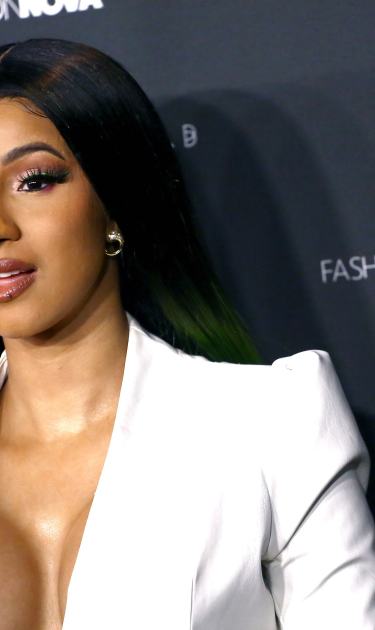The revolving love-hate relationship between celebrities and social media has nearly made guerilla paparazzi a thing of the past – a reminder that El Gordo y La Flaca journalist Gelena Solano received during a recent standoff with Cardi B. Launching into a quarrel with a visibly disturbed Cardi, Solano and her camera crew hounded Cardi’s family as they tried to indulge in a spa day at an undisclosed location in Washington Heights. In response, Cardi tried to reason with Solano, saying that she was unprepared to be seen that day, since she didn’t arrive in makeup. Instead of withholding from recording Cardi, Solano continued, even pushing Cardi’s father to speak on camera.
Solano attempted to relate to the rapper by declaring that she too, was Dominican. During the encounter, Cardi was almost trampled by a random passerby, who urged her to move from the sidewalk as she was bewildered by Solando’s presence. The issue arose when Solano – who’s been a reporter for 15 years – believed that the tradition of luring celebrities into boundary-crossing access should remain a normality.
Long before Cardi B released her debut album Invasion of Privacy, she was widely known for being a spirited influencer through humorous Instagram videos, and from her recurring appearance on VH1’s Love & Hip-Hop. This was prior to her breakthrough as a global pop star, but the fast track to fame forced Cardi to protect both her dignity and family. Cardi avoided exposing her then-newborn daughter, Kulture, to the spotlight; she’d conceal her face on social media. Cardi later had a change of heart, allowing husband Offset to include their daughter on the album artwork for his standalone album Father of 4. Though Kulture was not filmed at the time of Cardi’s run-in with Gelena Solano, she was still present. The altercation represented what Cardi was initially fearful of: unapproved accessibility.
Cardi B’s father received the brunt end of the stick during Solano’s ambush, as he was intentionally filmed which escalated Cardi’s annoyance. While her father’s identity was blurred, Cardi vocalized the danger that recording her father could entail. Not only was it a risky move on Solano’s behalf, but it also increased the chances of stalking from fans, an occurrence that Cardi later referenced in a Instagram Live stream, followed by an apology after the incident.

Though Solano has been a monumental facet in Latino media, her professionalism was unlike what her career as a veteran El Gordo y La Flaca correspondent should reflect. Even worse was her effort at placing blame on Cardi for being unprepared for filming during a leisurely day with her family.
The exchange between the two also unmasked long-brewing colorism in the Latinx community. Solano, being a white Latina, victimized her actions as a journalist by scolding Cardi B’s defensiveness as a black woman. Though she tried eagerly to connect with Cardi B as a Dominican (by saying she was), Solano instead positioned herself in a wholesome light as a correspondent who was merely doing her job, even if it endangered a family who didn’t want to be visible.
Even if Cardi seemed aggressive with Solano, her response was suitable, as it mirrored a harrowing trend of entertainment sources who disrupt the privacy of celebrities. All too often have Cardi B’s pleads for space been ignored. She was previously hounded at an Australian airport. Disgruntled with Cardi B not wanting to mingle with fans, a woman, also a fan, was recorded inaudibly referencing Cardi B’s husband. Cardi’s publicist exploded on the woman in Cardi’s defense.

Though social media provides a glimpse at the true nature of celebrities, it should not alter how the media engages with them. The cultural trope of sensationalism is permissive, emitting an ever-readiness that doesn’t factor in the human element of being a celebrity. The mad dash of press approaching a celebrity alongside their respective family also doesn’t consider their right to anonymity. Rather than flagrantly entering the personal lives of celebrities, there should be a respectability standard, one that doesn’t haphazardly jeopardize their public persona.
Cardi B enthusiastically engages with her core fanbase, an act of affection that she hasn’t let subside even as she’s generated attention public consumption in numbers. While she exemplifies being a unbarred personality, there’s still boundaries that entertainment sources should set in stone. Besides, Cardi “don’t need more press.”




